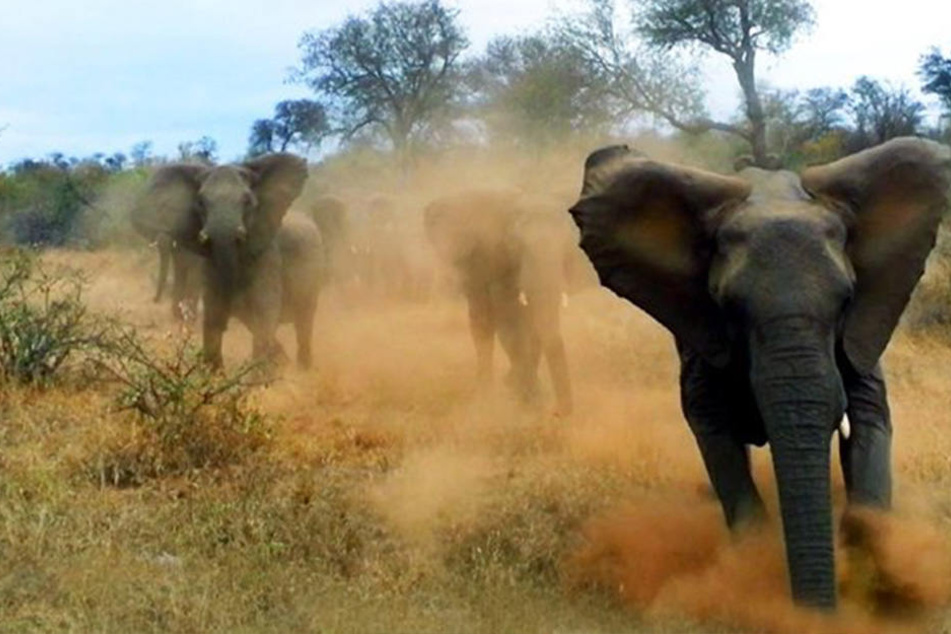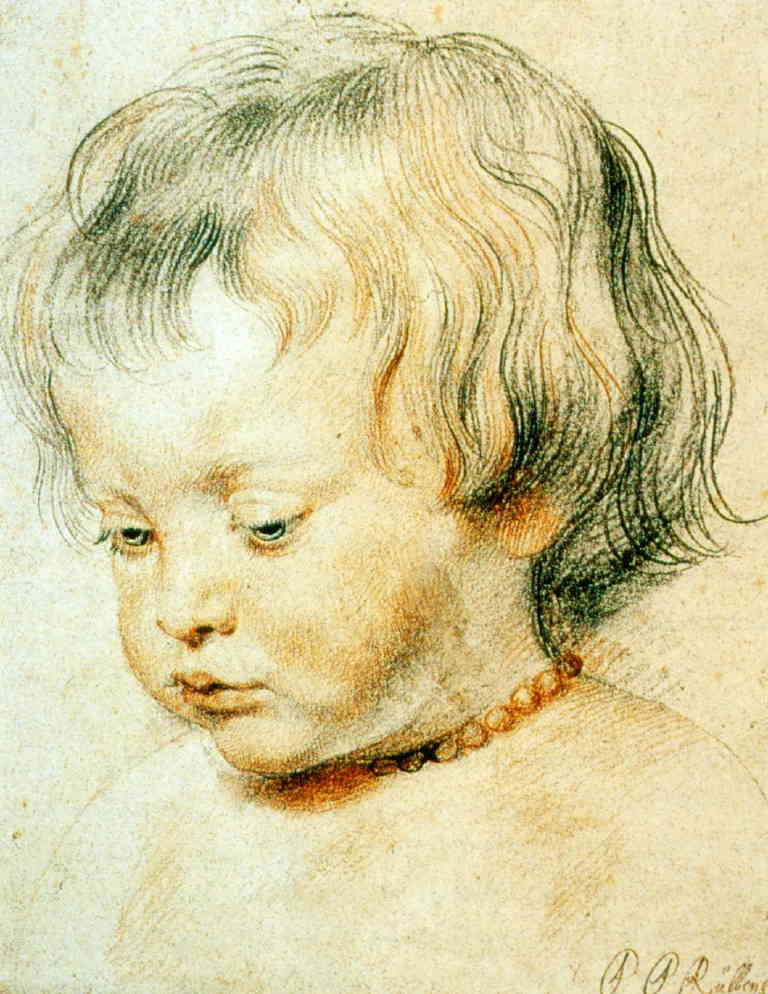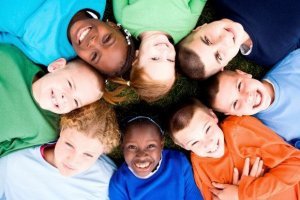
Hawkins / Kinder
Inhaltsverzeichnis: (verbergen)
 |
|
Nichts hat psychologisch gesehen einen stärkeren Einfluss auf ihre Umgebung und besonders auf ihre Kinder als das ungelebte Leben der Eltern. |
|
Wer sich seiner eigenen Kindheit nicht mehr |
Persönliches Bekenntnis
Angemessene Behandlung von ADHS-Symptomen – See also: Attention deficit hyperactivity disorder (ADHD)
|
Ohrenwedelnde Altbullen zähmen wildgewordene Jungelefanten.
Junge afrikanische Elefantenbullen verhielten sich seltsam artfremd – asozial und unvermittelt gewalttätig. Sie trampelten auf VWs herum, traten grundlos Bäume nieder und töteten Kleintiere und Babyelefanten.[*]  Wildgewordene Elefanten greifen ein Dorf in Nepal an. Die angereisten Parkranger untersuchten das Problem vor Ort. Sie kamen zu dem Schluss, dass es in diesem Gebiet keine älte-
Ihr Lösungansatz?1
Mit dem Hubschrauber flogen sie einige ältere Bullen aus anderen Gebieten ein und hievten sie mit einem Hebekran auf das Gelän-
[*] Phasenweise Testosteronschübe (Musth) lösen bei jungen Elefantenbullen erhöhte Aggressivität und Gewaltbereitschaft aus. |
| Quelle: ► Richard Rohr (*1943) US-amerikanischer Franziskanerpater, Enneagrammlehrer, Autor, Adams Wiederkehr. Initiation und Männerspiritualität, Claudius Verlag, 1. Auflage 1. Juli 2013 |
| Literature: ► Warren Farrell Farrell.com (*1943) US American political scientist, author, spokesman of men's liberation, men's rights activist, former director of the National Organisation for Women, speaker, author, John Gray (*1951) US American relationship counselor, lecturer, author, The Boy Crisis. Why Our Boys Are Struggling and What We Can Do About It, BenBella Books, 29. March 2018 |
| Referenz: de.Wikipedia-Eintrag ► Aufmerksamkeitsdefizit-/Hyperaktivitätsstörung (ADHS) |
| Referenz: ► ADHS Aufmerksamkeits-Defizit-Hyperaktivitäts-Störung, präsentiert von adhs.de, undatiert |
| Siehe auch: ► Gewalt und ► Maerchen und ► Männer und ► Gesundheit |
| See also: ► Attention deficit hyperactivity disorder (ADHD) |
|
| |||||||||||||||||||||||||||||||||||||||||||
|
| Literatur von Lloyd deMause (1931-2020) US-amerikanischer Sozialwissenschaftler, Laienpsychoanalytiker, Pionier der Psychohistorie, Präsident der Internationalen Psychohistorischen Vereinigung, Herausgeber des Journal of Psychohistory, ► Hört ihr die Kinder weinen. Eine psychogenetische Geschichte der Kindheit, Suhrkamp Verlag, Frankfurt am Main, 1980, 1990 ► Aurel Ende, Herausgeber, Grundlagen der Psychohistorie. Psychohistorische Schriften, Suhrkamp Verlag, Frankfurt am Main, 1989 ► Artur R. Boelderl, Herausgeber, Ludwig Janus, Herausgeber, Was ist Psychohistorie? Eine Grundlegung, Psychosozial-Verlag, Gießen, 1. Taschenbuchauflage 1. Juli 2000 |
| Referenz: ► Beitrag Welche missbräuchlichen Erziehungsmaßnahmen an Kleinkindern haben einerseits Persönlichkeitsstörungen ausgelöst und andererseits in der gesamtgesellschaftlichen Entwicklung historische Abdrücke hinterlassen?, präsentiert von der kalifornischen Frage-und-Antwort Webseite Quora, Elfriede Ammann, 8. Juni 2019 |
| Referenz: de.Wikipedia-Eintrag ► Psychohistorie |
US American psychoanalyst and critical author on Sigmund Freud's theoretical concepts and psychoanalysis Jeffrey Moussaieff Masson, Ph.D. (*1941) debunked Freud's seduction theory in his book The Assault on Truth. Freud's Suppression of the Seduction Theory, 1984.
See also: Confabulation
Persönliche Bekenntnisse

Empfehlungen
Schlussfolgerungen

|
Literaturzitate
Gedichte
|
Wenn ein Kind ...
Wenn ein Kind verstanden und toleriert wird, lernt es geduldig zu sein.
Wenn ein Kind gelobt wird, lernt es, sich selbst zu schätzen.
Wenn ein Kind geborgen lebt, lernt es, zu vertrauen.
Wenn ein Kind in Freundschaft angenommen wird, lernt es, in der Welt Liebe zu finden. |
Text verfasst von einer tibetischen Schule
Appell

Personal avowals

Building a Culture of Empathy and Compassion Obama Empathy Speech Index
Exclamations – Questions
After relating his patient's memory of having been raped by her father at age two Freud cited Goethe's poem:
Mnemonic phrases for children to learn simple self-protection
Recommendations
Appeals
Recommendations
Caution
Warning
Future prospects
Conclusions
Insights

ADHD and Oppositional Defiant Disorder: 1. (General) poor impulse control, 2. Physical hyperactivity 3. Poor attention skills
|
Cultural shift in family building and relating patterns:
1. Companionship is primary.
2. Children are secondary.
Building a Culture of Empathy and Compassion Obama Empathy Speech Index; Watch also: Barack Obama's Speech on Father's Day, YouTube film, 23:48 minutes duration, posted 15. June 2008

|
Literary quotes
|
|
| Reference: ► US American dystopian drama fiction television series of 10 episodes The Handmaid's Tale, created by Bruce Miller based on the 1985 novel of the same title written by Margaret Atwood (*1939) Canadian writer, produced by MGM Television, filming started 2016, released 26. April 2017 |
| |||||||||||||||||||||||||||||||||||||||||||||||||||

|
| Inspired by sources featuring Lloyd deMause psychohistory.com (1931-2020) US American social scientist, lay psychoanalyst, director of The Association for Psychohistory, president of the "International Psychohistorical Association", editor of The Journal of Psychohistory, ► Free ebook The Origins of War in Child Abuse, Chapter 3: The Psychology and Neurobiology of Violence |
| Reference: ► Q&A contribution Which modes of abusive childrearing resulted both in respective psychiatric disorders and manifested in historical periods?, presented on the Californian question-and-answer website Quora, Elfriede Ammann, reference to Lloyd deMause, 869 views · 4 upvotes, 7. June 2019 |
| Offered for free by the US American Freedomain Podcasts, A Voice for Men, narrated for free by founder and host by Stefan Molyneux (*1966) Irish-born Canadian blogger/vlogger, podcaster on anarcho-capitalism, politics, secular ethics, atheism, right-libertarianism, cryptocurrencies, self-published author ► Free full audiobook The Origins of War in Child Abuse, YouTube film, 10:21:46 duration, posted 7. September 2015 ► Free audio podcast of chapter 3 "The Psychology and Neurobiology of Violence" MP3, 1:11:10 duration, posted 3. September 2008 |
| Reference: ► Wikipedia.en entry: Psychogenic mode |
| See also: ► ⚡ Systemic dumbing-drugging down of modern Western society ► From conception to birth – Stanislav Grof ► Three archetypal wounds in trust and love – Mario Martinez ► Spiral Dynamics maps – presented by ⚡ Ken Wilber |
|
| Source: ► Article 25 Manners Every Kid Should Know By Age 9, presented by the US American monthly magazine Parents, David Lowry, Ph.D., British research consultant with specialist knowledge of UK and EU nuclear and environment policy, March 2011 |
|
As a 6-year-old black girl Ruby Bridges (*1954) became a shero of race integration. She was the first black child to enter an all-white school in the history of the American South. |
| Sources: ► TV Video movie Ruby Bridges 1998 [ FULL MOVIE ] Penelope Ann Miller, Kevin Pollak, Facebook film, minute 1:12:28, minute 1:15:48, 1:38:00 duration, posted 25. March 2020 |
| Reference: ► Biographical entry Ruby Bridges Biography. Civil Rights Activist (1954), undated |
|
| Source: ► Article 8-Year-Old Boy Talks About The Pineal Gland & TV Brainwash. There's Hope For The Future!, presented by the online publication Collective Evolution, Elina St-Onge, 22. June 2016 |
| Reference literature: ► Tom Shroder (*1954) US American editor, journalist, writer, Old Souls. The Scientific Evidence For Past Lives, Simon & Schuster, 1999 |
| See also: ► Soul ages – Chelsea Quinn Yarbro ► Features of old souls ► Old souls and their love life ► Characteristics of and myths about introverts ► Seele and ► Compassion and ► Sensitivity and ► Motherhood and ► Equality and ► Subtle energies and ► Creativity and ► Schooling ► Depression and ► Listening and ► Intuition and ► Empathy and ► Whistleblower and ► Loneliness and ► Animals |
| Source: ► Khalil Gibran (1883-1931) Lebanese American painter, philosopher, poet, The Prophet, On Children, S. 17, Alfred A. Knopf, 1923, 1980, Laurier Books, 14. April 2003, Penguin Classics, 27. August 2020 |
Links zum Thema Kinder, Elternschaft und Erziehung / Children, parenthood and educationLiteratur
Gleichwürdigkeit, Integrität, Authentizität, Verantwortung
Literature (engl.)
Externe Weblinks
Links zum Thema Kinder – QuoraBeiträge verfasst von Elfriede Ammann, präsentiert auf der kalifornischen Frage-und-Antwort Webseite Quora DE
External web links (engl.)
A disciplinary approach outlined in the book by Purvis et al., The Connected Child, S. 93, 2007
Seven months before his death at age 87 Russian Jewish American psychiatrist and "scientific father of ADHD" Leon Eisenberg, M.D., D.Sc. (1922-2009) confessed in his last interview:
The more children are spanked, the more likely they are to defy their parents and to experience increased anti-social behavior, aggression, mental health problems and cognitive difficulties, according to meta-analysis of 50 years of research involving over 160,000 children on spanking by experts at The University of Texas at Austin and the University of Michigan. Spanking is associated with negative outcomes consistently and across all types of studies. Spanking is linked with the same negative child outcomes (to a slightly lesser degree) as abuse.
Advice for parents: "Discipline older children by temporarily removing favorite privileges, such as sports activities or playing with friends."
Audio- und Videolinks
Behütet-frei, un"ver"schult, begeistert lernend
Der amerikanische Psychiater Dr. med. Leon Eisenberg (1922-2009) Erfinder des psychiatrischen Krankheitsbilds Aufmerksamkeitsdefizit-/Hyperaktivitätssyndrom (ADHS) gestand dem Medizinjournalisten Jörg Blech, dass ADHS eine fabrizierte Erkrankung
Zu unter 1% schlägt Ritalin gut an bei Zappelphilip-Kindern.
Linkloses Medienangebot
Die beste Art des Lernens für Kinder anhand der Beziehungsforschung von Prof. Dr. Gordon Neufeld
Nach einer Studie "der pronova BKK" beobachteten 150 Kinderärzte, dass zu 89% vermehrte psychische Probleme bei Kindern aufgrund der politischen Covid19-Maßnahmen. 37% der Kinderärzte diagnostizieren eine Zunahme körperlicher Beschwerden bei Kindern. Eine Studie der Privaten Fachhochschule Göttingen erkannte, dass die Corona-Maßnahmen Depressionen verstärken und zu posttraumatischen Belastungsstörungen führen.
Filme, Dokumentationen
Problematik der Sexualisierung von Mädchen und Kindern. Frauen sind mehr als Sexobjekte. Die Werbung suggeriert weitgehend, dass frau Audio and video links (engl.)
Detrimental effects of the increasingly crowded infant vaccination schedule
Raising extraordinary child: prodigy, disabled kid, criminal
Documentaries
Collusion between Big Pharma drug companies and regulatory FDA watchdogs; millions of children forced onto pharmaceutical drugs for
Linkless media offerings
Audio and video links (engl.) – Gabor MatéAudios and videos by Gabor Maté, M.D. drgabormate.com (*1944) Hungarian-Canadian physician, addiction expert, speaker, author
Audio and video links (engl.) – Gordon NeufeldAudios and videos by Gordon Neufeld, Ph.D. (*1947) Canadian clinical developmental psychologist, author
| ||||||||||||||||||||||||||||||||||||||||||||||||||||||||||||||||||||||||||||||
Wiki-Ebene
Englisch Wiki
1 Ohrenwedelnde ältere Elefantenbullen ⇑
2 Dan Kindlon, Michael Thompson, Raising Cain. Protecting the Emotional Life of Boys, S. 72, Ballatine Books, New York, 1999 ⇑
3 Lewis DO, Shanok SS, Pincus JH, et al. Biopsychosocial Characteristics of Children Who Later Murder: A Prospective Study, presented by the free MEDLINE database PubMed, published in the Journal of American Academic Child Psychiatry, #18, pp. 307-319, 1979 ⇑
4 Richard Rhodes, Why They Kill. The Discoveries of a Maverick Criminologist, S. 206, Alfred A. Knopf, New York, 1999 ⇑
5 English Wikipedia deleted entry. ⇑
6 Sam Vaknin (*1961) Israeli journalist, editor-in-chief of the online magazine of politics Global Politician, publisher, author of DSM V Gets Narcissistic Personality Disorder Partly Right, YouTube film, 9:03 minutes duration, posted 13. October 2012
See also: Video links (engl.) by Sam Vaknin (attested psychopath diagnosed with Narcissistic Personality Disorder [NPD]) ⇑
7 Three archetypal wounds in trust and love – Mario Martinez ⇑
8 Sam Vaknin (*1961) Israeli journalist, editor-in-chief of the online magazine of politics Global Politician, publisher, author of Malignant Self-love. Narcissism Revisited, Narcissus Publications, Czech Republic, revised edition July 2001, Masochistic Personality Disorder (Masochism), YouTube film, 3:27 minutes duration, posted 7. November 2012
The Masochistic personality disorder appeared last in the DSM III-TR and was removed from the DSM IV and from its text revision, the DSM IV-TR. ⇑
9 Convention on the Rights of the Child has 54 articles, each outlines a different right (on survival, protection, development and participation). The United Nations Convention on the Rights of the Child has outlined a standard premise for the children's rights movement and has been accepted by all nations of the world but two states – the United States and Somalia.
Chapter IV Human Rights. 11. Convention on the Rights of the Child, New York, 20 November 1989, presented by United Nations Treaty Collection ⇑
10 Truth vs. Falsehood. How to Tell the Difference, S. 110, 2005 ⇑